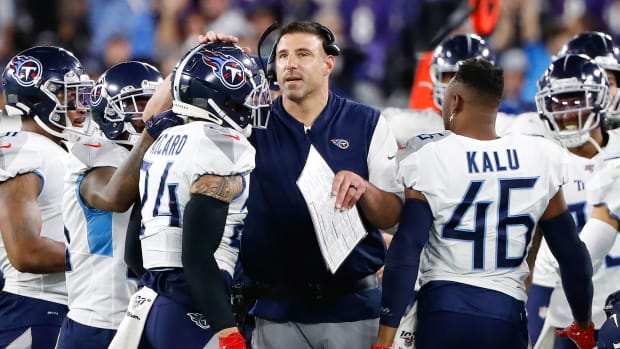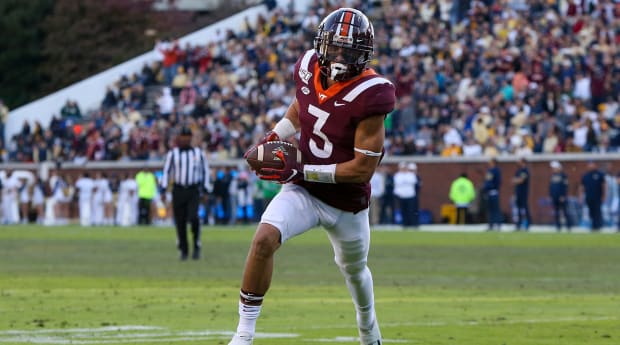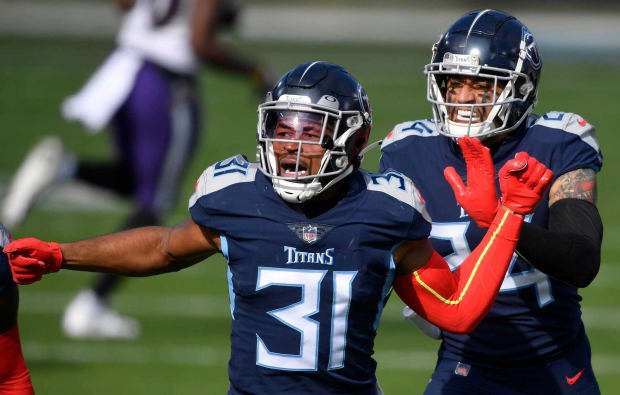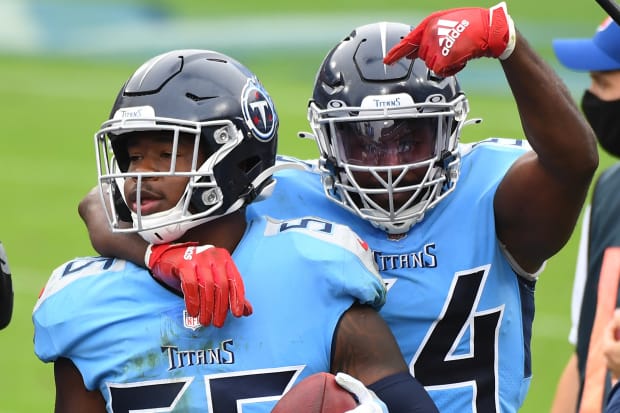A fantasy football breakdown of the Tennessee Titans by high-stakes legend Shawn Childs
Coaching
After going 9-7 each season from 2016 to 2019, the Titans pushed their record to 11-5 with an AFC South title. Mike Vrabel went 29-14 in his first three years as head coach while reaching the postseason in back-to-back seasons. All seven years of his coaching experience in the NFL came on the defense side of the ball. Vrabel played in the league for 14 seasons at linebacker. His ties to New England and three Super Bowl titles were a big part of his path to a head coaching job.

Tennessee jumped to fourth in points scored (491) and second in yards gained. They scored 89 more points than in 2019. It was a breakthrough season offensively. The Titans finished with their best production since the early 1990s, back when Warren Moon was leading the show.
Todd Downing takes over as the offensive coordinator after working as Tennessee’s tight end coach in 2019 and 2020. He’s been a coach in the NFL since 2005. He led the Raiders’ offense for one season in 2017.
The Titans promoted Shane Bowen to run the defense, which came a year after not having a defensive coordinator. Over the last three seasons, he worked as a linebacker coach for Tennessee. Bowen has five seasons of coaching experience in the pros at the age of 34.
The defensive side of the ball declined for the second straight season. The Titans allowed the ninth-highest number of points (439 – 108 more than 2019) while finishing 28th in yards allowed.
Free Agency
Tennessee lost two key players (WR Corey Davis and TE Jonnu Smith) off their offense and two starters (CB Desmond King and DE Jadeveon Clowney).
Davis showed more explosiveness and consistency last year after struggling to fulfill his expected value after getting drafted in the first round in 2017. He set career highs in receiving yards (984) and touchdowns (5) while matching his 2018 season in catches (65). Davis posted four impact games (7/101, 8/128/1, 11/182/1, and 4/110/1). He missed two games with a COVID-19 issue.
More Tennessee Titans Coverage from SISmith has improved upon his stats every season. He set career bests in catches (41), yards (448), and touchdowns (8) despite receiving only 65 targets. His season started with 18 catches for 221 and five touchdowns over four games, but Smith failed to score over 12.00 fantasy points over his last 12 games (including the playoffs). He gained over 35 yards in one contest over this span.
King added value to the run defense with some success blitzing the quarterback. When at his best over his first three seasons with the Chargers, King made 189 tackles with 6.5 sacks, 17 defended passes, and four interceptions.
Clowney continues to underachieve in the pass rush (32 sacks in 83 career games) while making his fourth franchise change since 2018. Over the last two seasons, he missed 13 starts. His game does play well in run support.
The Titans added DE Bud Dupree and WR Josh Reynolds in the offseason.
Dupree missed five games last season due to a torn ACL in his left knee. He delivered 19.5 sacks over his previous 27 games while being a liability in most seasons in run support. He continues to miss too many tackles.
Reynolds worked as the third wide receiver for the Rams over the last four seasons. His catch rate (50.8) over his first three seasons. Last year, Los Angeles gave him more chances close to the line of scrimmage, leading to a bump in his overall production (52/618/2).
The only other player of value lost was DT DaQuan Jones, who signed with the Panthers. His play worked well against the run over the past two seasons while offering minimal sacks (eight over his last 92 games).
Draft
CB Caleb Farley

Farley brings a press coverage skill set to the Titans with speed to cover his receivers over the long field. He is a former quarterback with limited experience playing at cornerback. His success at college came from his physical talents, but Farley can’t push higher without improving his technique and his feel for play development in tight quarters. With first-round pedigree, he has a boom or bust feel.
LB Monty Rice
Rice has a do you job mentality with excellent timing and feel for his responsibilities against the run. His vision is a significant plus, which offset his lack of impact speed. Rice should be a productive player at the next level on early downs.
CB Elijah Molden
Molden has the foundation skill set to be a top cornerback, but his only missing trait is his overall speed. He plays with vision and excellent cover skills, and the ability to support the run. Molden should excel over the short areas of the field and in the red zone. His lack of size (5’9” and 192 lbs.) is a concern, and top wide receivers with speed will test him in deep coverage.
T Dillon Radunz
His game should bolster Tennessee's quick-hitting run game where his first step and power play well. His range looks limited, putting him at risk when facing pass rushers outside his frame. Radunz projects better at guard than at tackle.
WR Dez Fitzpatrick
Fitzpatrick gives Tennessee a wideout who will test a defense deep with jump ball ability in the end zone, but his release and hands limit his explosiveness. His lack of quickness and route-running point to minimal value over the short areas of the field. Fitzpatrick won’t create in the open field and make good reads on option routes.
WR Racey McMath
McMath needs to clean up his release and route running to take advantage of his plus speed. His hands and ability to catch in tight quarters look to be assets. He’ll struggle with press coverage while owning a limited flight plan. McMath does project well on special teams.
DE Rashad Weaver
Weaver packs a winning punch, which is the only club in his bag that disrupts after the snap. He won’t win with speed or quickness, and his willingness to fire can lead to mistakes against the run. His game projects better on early downs where his power will disrupt and create sneaky value in sacks.
S Brady Breeze
Breeze plays well when attacking the line of scrimmage against the run, but he will short circuit if meeting big bodies. His cover skill doesn’t project well, and speed will be a problem at the next level. Breeze plays with vision and an excellent feel for play development. In his rookie season, he may have to earn his keep in the coverage game.
Want even more fantasy and betting analysis? Become an SI Fantasy PRO member today and start beating the books and winning your leagues with us!

Offensive Line
The Titans moved up a notch to second in the NFL in rushing yards (2,690) with 26 touchdowns and 20 runs over 20 yards. Their ball carriers gained 5.2 yards per rush.
Tennessee slipped to 23rd in passing yards (3,826) with 33 passing touchdowns and seven interceptions. Their quarterbacks gained only 7.9 yards per pass attempt with only 44 completions over 20 yards. The Titans’ offensive line allowed 25 sacks.
LT Taylor Lewan
Lewan has been a top player at his position over his six seasons in the league. Last year he missed 11 games with a right shoulder issue and a torn ACL in his right knee. His best value comes in pass protection while showing strength in run blocking in most of his years in the league. Lewan is a former first-round draft pick (2014).
LG Rodger Saffold
Saffold signed a four-year $44 million contract with the Titans in 2019. His game was elite from 2012 to 2014 as a pass protector while developing into an excellent balanced player over his next four seasons. Since arriving in Tennessee, Safford showed more risk in pass protection while having a high floor in run blocking.
C Ben Jones
Jones now has seven straight years on his resume, where he’s been a league-average player or better in all areas. Jones hasn’t missed a game over his past seven seasons after being drafted in the fourth round in 2012. In 2020, Jones allowed minimal pressure and no sacks.
RG Nate Davis
The Titans added Davis in the third round in 2019. He finished as a liability in his rookie season in all areas. His run blocking improved last year, where it can now be considered better than the league average. Davis still allows too much pressure on the quarterback.
RT Dillon Radunz
Tennessee may ease Radunz into action in his rookie season. They wasted a first-round selection on T Isaiah Wilson in 2020, forcing the Titans to place another early draft bet on the offensive line this year. Radunz has experience at tackle with more value in run blocking early in his career. I expect him to be a liability if he does indeed start.
OL Snapshot
The left side of the Titans’ offensive line ranks near the top of the league, with a player of value at the center position. Defenses will attack the quarterback on the right side until Davis and Radunz show growth in pass protection. Overall, the Titans should run the ball well again while seeing an increase in sacks allowed.
Offense

Tennessee ran the ball 51.9 percent of the time in 2020 while offering explosiveness in scoring in the passing game. Ideally, the Titans want to play well defensively while running the ball when playing from the lead.
Quarterbacks
Ryan Tannehill
Over his 28 starts for the Titans, Tannehill has 18 wins and 10 losses with two trips to the postseason. Last year he set a career-high in passing touchdowns (33) while offering his best production on the ground (43/266/7). Tannehill finished eighth in quarterback scoring (390.55 fantasy points) in four-point passing touchdown leagues. He averaged 255 combined yards per game despite Tennessee attempting the third-lowest number of passing attempts (481).
Tannehill scored over 29.00 fantasy points in six matchups (29.15, 31.95, 34.30, 32.45, 39.75, and 30.60), with five of these games coming at home. Twenty-five of his 40 scores came at home. He passed for over 300 yards three times.
Fantasy Outlook: His receiving core took a hit in the offseason by losing WR Corey Davis and TE Jonnu Smith, and the Titans continue to lack depth and strength at both wide receiver and tight end. A.J. Brown has a high ceiling, but Tannehill will struggle to find open receivers in many games. He ranks as the 14th quarterback drafted in the early draft season, which is too high based on the Titans' offensive structure. I expect a drop of 12 to 15 touchdowns with dull production in passing yards. At best, Tannehill is a bye-week cover with backend QB2 value.
Other Options: Logan Woodside, DeShone Kizer
Running Backs

The Titans barely used their running backs in the passing game (36/219/2 on 56 targets). On the running side, Tennessee led the NFL in running back rushing yards (2,414) thanks to a league-high in rushing attempts (472). They scored 17 touchdowns on the ground for the second straight year.
Derrick Henry
In each year in the NFL, Henry improved on his output in rushing yards, along with his rushing attempts. In 2020, he had the fifth-most rushing yards (2,027) in NFL history for a single season on a league-high 378 attempts. Henry had 16 runs over 20 yards, and four of those carries reached the 40-yard mark.
His best two games (22/264/2 with two catches and 34/250/2) came against the Texans. Henry had gained over 100 yards in seven other matchups while delivering over 200 yards in one other game (26/215/2 and two catches). He averaged a career-high 5.4 yards per rush.
Fantasy Outlook: Of the seven other running backs to rush for over 2,000 yards, Barry Sanders had the smallest regression in rushing yards (562 – 2,053 in 1997 and 1,491 in 1998) the following season. Henry is horseback, with a short opportunity in the passing game. The lack of talent at wide receiver should lead to fewer big plays. He has the makings of a first-round bust based on the direction of this offense.
Darrynton Evans
A hamstring injury cost Evans 11 games in his rookie season. He finished with only 81 combined yards with a touchdown and two catches on 16 touches.
Fantasy Outlook: Evans brings plus speed and change of pace value. The Titans will get him on the field, but he projects more as an upside handcuff with a minimal opportunity out of the gate.
Other Options: Jeremy McNichols, Brian Hill, Mekhi Sargent
Wide Receivers

The wide receiver opportunity for the Titans increased over the past two seasons. Their wideouts accounted for 69 percent of Tennessee’s passing yards, with about 59 percent of the team’s completions.
A.J. Brown
Over his first two seasons, Brown gained over 1,000 yards each year (52/1,051 and 70/1,075) while scoring 19 touchdowns in 30 games. In the offseason, he had surgery on both knees. Even with an explosive feel and an improving catch rate (66), Brown doesn’t have the opportunity to match the elite wide receivers in the game.
He gained over 100 yards in four contests (6/153/1, 4/101/1, 7/112/1, and 10/151/1) when he picked up nine of his 13 catches over 20 yards. Brown had over five catches in five of his 14 starts.
He gained 17.4 yards per catch in his career, with 13 of his 122 catches gaining 40 yards or more.
Fantasy Outlook: Brown finished 12th in wide receiver scoring (248.50 fantasy points) in PPR leagues despite missing two games, nine spots higher than 2019 (217.30 fantasy points). With a dropdown at WR2 in Tennessee, his freedoms in the secondary could be less, but Brown should see more targets by default. His early ADP (22) as the fifth wideout drafted points to an impact player. His next step should be 90 catches for 1,300 yards and a floor of 12 touchdowns.
Josh Reynolds
In his fourth season, Reynolds set career-highs in catches (52), receiving yards (618), and targets (81). He gained over 20 yards on 22 of his 102 catches over the past three years. His catch rate (64.1) pushed higher, Reynolds saw a decline in his yards per catch (11.9 – 15.5 in 2019 and 13.9 in 2018).
This season, Reynolds replaced Corey Davis (65/984/5) in Tennessee’s starting lineup. The third wideout for the Titans in 2020 only had 23 catches for 228 yards and two touchdowns.
Fantasy Outlook: The depth behind Reynolds doesn’t project high, but I can’t expect him to make a jump in a top-tier wide receiver. His natural progression points to 65-plus catches for 800 yards with five to seven touchdowns. His ADP (212) ranks him as the 73rd wide receiver drafted. Reynolds has a chance to work as WR4 in PPR leagues.
Dez Fitzpatrick
Over four seasons at Louisville, Fitzpatrick caught 154 passes for 2,589 yards and 21 touchdowns. He gained 16.8 yards per catch while posting weakness in his catch rate (57.2). His best year came in his freshman year (45/699/9), pointing to regression in his growth.
Fantasy Outlook: Fitzpatrick may offer flash value in some games if/when he hits on a long score. His play will be up and down with minimal chances each week.
Racey McMath
McMath had a minimal opportunity over the past two seasons at LSU. He caught 31 of 47 targets for 480 yards and four touchdowns. His game needs plenty of work, pointing to a bench role early in his career.
Other Options: Cameron Batson, Nick Westbrook-Ikhine, Chester Rogers
Tight Ends

The tight end position was an important part of the Titans’ passing game last year, especially at the goal line. They finished with 94 catches for 967 yards and 12 touchdowns on 137 targets. Tennessee gained about 25 percent of their passing yards over the past three seasons from the tight ends while receiving close to 30 percent of their completions.
Anthony Firkser
As the second tight end for the Titans in 2020, Firkser caught 39 passes for 387 yards and one touchdown on 53 targets. He gained 9.9 yards per catch with strength in his catch rate (73.6). His only game of value came in Week 6 (8/113/1) against the Texans.
Fantasy Outlook: Tennessee will rotate in multiple tight ends this season, which makes Firkser tough to time when to start him as a matchup play. The Titans have no choice but use their tight ends in the passing game with weakness at the WR3 position and minimal usage in the passing game out of the backfield. His next step should be 50 catches for 500 yards with short value in touchdowns.
Other Options: Geoff Swain, Jared Pinkney, Tommy Hudson, Briley Moore
Kicker
Tucker McCann
The kicking job is wide open heading into the 2021 season for the Titans. Last year, the Titans’ scored 62 touchdowns while creating 28 field-goal tries.
McCann made only 72.6 percent of his field goal kicks over four seasons at Missouri. He also missed 12 of his 187 extra-point tries. I can’t see him emerging as the Titans’ kicker.
Blake Haubeil
Over three seasons at Ohio State, Haubeil made all 146 of his extra points. He finished with 28 made field goals in his 35 chances (80 percent).

Defense
The Titans fell to 19th in rushing yards allowed (1,933) in 2020 while allowing 18 touchdowns and 12 runs over 20 yards. Ball carriers gained 4.5 yards per rush while averaging 26.6 rushing attempts per game.
Tennessee dropped to 29th in passing yards allowed (4,439), with quarterbacks tossing 36 touchdowns and 15 interceptions. Their defense created only 19 sacks.
DT Jeffery Simmons
Last year he made 49 tackles with three sacks and five defended passes. Simmons played at a high level against the run.
DE Larrell Murchison
Last year he saw minimal playing time due to a back issue.
DE Denico Autry
Over the last three seasons, Autry posted 102 combined targets with 20 sacks. His run defense continues to fade with a high number of missed tackles.
LB Bud Dupree
Dupree missed five games last year with a knee injury. He has 19.5 sacks over the past 27 games with 99 combined tackles. His run defense is league average at best, but his disruptive pass rush is why he's now in Tennessee.

LB Jayon Brown
Brown set a career-high in tackles (105) in 2019 with some growth in pass coverage (one Int, eight defended passes, and one TD). Last season, he missed six games with a broken elbow, leading 76 tackles and one sack. His run defense remains a weakness in his game.
LB Rashaan Evans
Over the last two seasons, Evans had 207 combined tackles with three sacks and five defended passes. His run defense came in below expectation in 2020.
LB Harold Landry
In his third year in the NFL, Landry picked up 5.5 sacks with a slight bump in tackles (69). His run defense slipped below the league average.
CB Janoris Jenkins
Jenkins moved into the starting lineup after signing in the offseason. Over the last two seasons with the Giants and Saints, he made 109 combined tackles with seven interceptions and 26 defended passes.
CB Kristian Fulton
Fulton will push for starting snaps in 2021.
S Kevin Byard
Byard has been a top player at safety over the last four seasons. He continues to be an impact player in run support (111 tackles) while making plenty of plays in coverage (20 interceptions and 40 defended passes over the last four years).
S Amari Hooker
Hooker played well in his second year and finished with 51 tackles, four interceptions, and eight defended passes. Last year, Hooker made only three starts while showing risk against the run. His role should expand in 2021.
Fantasy Defense Snapshot
The Titans’ defense has significant issues on the defensive line. Tennessee has to rebuild the cornerback position while having a question at strong safety. The linebacking core will set the tone on the defensive side of the ball. The Titans’ defense will have more downs than ups in 2021, and I don’t see any starting fantasy value.
More Fantasy Team Outlooks:

0 Comments:
Post a Comment